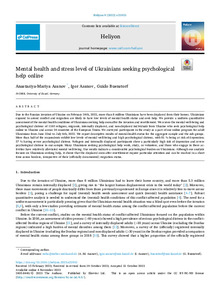| dc.date.accessioned | 2023-12-08T07:58:49Z | |
| dc.date.available | 2023-12-08T07:58:49Z | |
| dc.date.issued | 2023-11-04 | |
| dc.identifier | doi:10.17170/kobra-202312089180 | |
| dc.identifier.uri | http://hdl.handle.net/123456789/15273 | |
| dc.description.sponsorship | Gefördert durch den Publikationsfonds der Universität Kassel | |
| dc.language.iso | eng | |
| dc.rights | Attribution-NonCommercial-NoDerivatives 4.0 International | * |
| dc.rights.uri | http://creativecommons.org/licenses/by-nc-nd/4.0/ | * |
| dc.subject | Ukrainische Bevölkerung | ger |
| dc.subject | Stresslevel | ger |
| dc.subject | Mentale Gesundheit | ger |
| dc.subject | online Hilfe suchen | ger |
| dc.subject.ddc | 150 | |
| dc.subject.ddc | 300 | |
| dc.subject.ddc | 610 | |
| dc.title | Mental health and stress level of Ukrainians seeking psychological help online | eng |
| dc.type | Aufsatz | |
| dcterms.abstract | Due to the Russian invasion of Ukraine on February 24th, 2022, more than 8 million Ukrainians have been displaced from their homes. Ukrainians exposed to armed conflict and migration are likely to have low levels of mental health status and seek help. We provide a uniform quantitative assessment of the mental health conditions of Ukrainians seeking help soon after the invasion and resettlement. We screen the mental well-being and psychological distress of 1165 refugees, migrants, internally displaced, and non-displaced individuals from Ukraine who seek psychological help online in Ukraine and across 24 countries of the European Union. We surveyed participants in the study as a part of our online program for adult Ukrainians from June 22nd to July 6th, 2022. We report descriptive results of mental-health status for the aggregate sample and the sub-groups. More than half of the respondents exhibit low levels of mental well-being and high psychological distress, with 81 % being at risk of depression; 57 % having severe psychological distress. Refugees and internally displaced participants show a particularly high risk of depression and severe psychological distress in our sample. Many Ukrainians seeking psychological help work, study, or volunteer, and those who engage in these activities have relatively alleviated mental well-being. Our results indicate a considerable psychological burden on Ukrainians. Although our analysis focuses on Ukrainians seeking help, it shows that the displaced soon after resettlement require particular attention and can be reached in a short time across borders, irrespective of their (officially documented) migration status. | eng |
| dcterms.accessRights | open access | |
| dcterms.creator | Asanov, Anastasiya-Mariya | |
| dcterms.creator | Asanov, Igor | |
| dcterms.creator | Bünstorf, Guido | |
| dc.relation.doi | doi:10.1016/j.heliyon.2023.e21933 | |
| dc.subject.swd | Ukraine | ger |
| dc.subject.swd | Psychische Gesundheit | ger |
| dc.subject.swd | Suche | ger |
| dc.subject.swd | Hilfe | ger |
| dc.subject.swd | Online-Dienst | ger |
| dc.type.version | publishedVersion | |
| dcterms.source.identifier | eissn:2405-8440 | |
| dcterms.source.issue | Issue 11 | |
| dcterms.source.journal | Heliyon | eng |
| dcterms.source.volume | Volume 9 | |
| kup.iskup | false | |
| dcterms.source.articlenumber | e21933 | |


